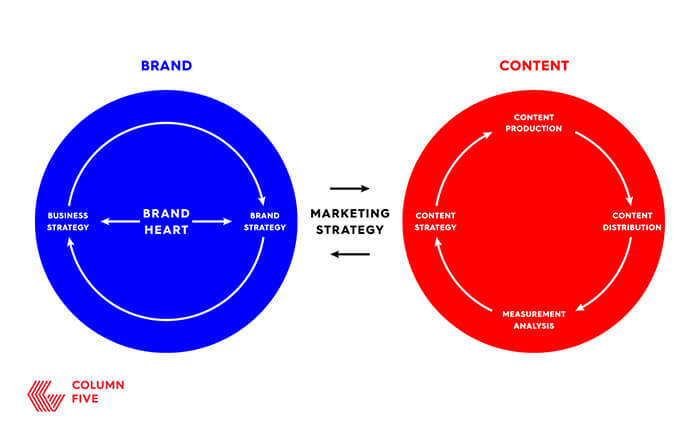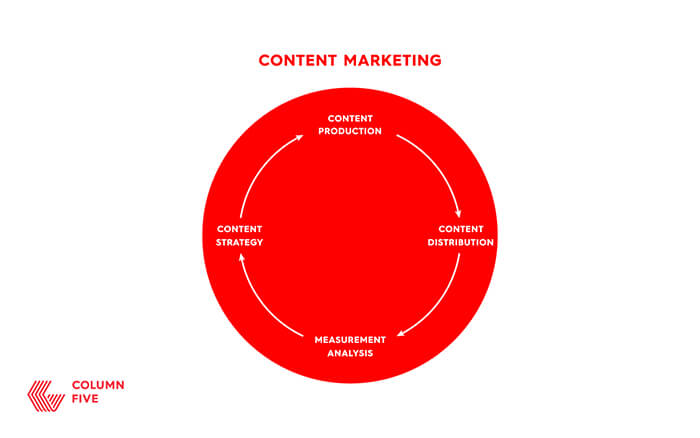How do you tell your brand story in a compelling way? How do you engage people and cultivate a lasting relationship with them? By clearly communicating who you are, what you’re about, and what value you can provide to them—in a way that’s actually interesting to them. What’s the best way to accomplish this? Telling stories (or, in other words, content marketing).
Content marketing isn’t new, but we find people are often confused about what it really is and how it fits into a brand’s goals. To connect the dots and help you do it better, we’re breaking down what it is, why it matters, and what it takes to be successful. If you haven’t done content marketing before (or haven’t had much luck with it), here’s everything you need to know to get it right from the start.
What Is Content Marketing?
Content marketing isn’t complicated. At its core, it’s the practice of using your brand’s stories to connect with people. By sharing interesting stories you help educate or entertain people. You provide them with something of value, while giving them a sense of who you are and what you’re about.
The action comes later; if the folks you’ve educated or entertained have need for your services, who do you think they’re going to want to buy from?
“All things being equal, people will do business with, and refer business to, those people they know, like, and trust.”
—Bob Burg
Because people want to align themselves with brands that share their same values, content marketing is the best way (IMO) to introduce your brand to people and welcome them into your brand story.
(Note: When I use the term “content marketing,” it encompasses everything related to creating and sharing stories, from content strategy, to content creation, to content distribution.)
How Does Content Marketing Help Your Brand?
The short-term goal of content marketing is to form a relationship with people and make them like—even fall in love with—your brand. It’s as simple as that.
“People don’t like to be sold, but they like to buy.”
—Jeffrey Gitomer
The long-term goal is to cultivate a strong enough connection that they’ll enthusiastically want to be part of what you’re building. Depending on the person and the brand, that can mean:
- They’ll want to buy from you.
- They’ll want to tell all their friends and colleagues about you.
- They’ll want to work with you.
- They’ll want to work for you.
Having people that fit these descriptions is crucial for your brand’s long-term success.
Where Does Content Marketing Fit Into Your Business?
Content marketing should be thought of as an output of your business and brand strategy—more specifically, as the key external application of your brand strategy. It is the means by which you share your brand story to help build your brand, which helps you achieve your business goals. Ultimately, it’s a symbiotic ecosystem.

Brand Heart: Your core identity (aka the heart of your brand) is the essence of who you are and what you do. It’s comprised of your:
- Purpose: Why does your business exist?
- Vision: What future do you want to help create?
- Mission: How do you create that future?
- Values: Who are you? How do you work?
You can’t build a solid brand without an intimate understanding of your brand heart. Any attempts to pursue content marketing without an established core are likely to fall flat.
Business Goals and Objectives: This is what your business is trying to achieve: your benchmarks, goals, etc.
Business Strategy: This is the systematic plan you develop to achieve your business goals and objectives (think organizational and operational things).
Brand Strategy: This is the systematic plan you develop to build a brand in order to achieve your business goals and objectives.
Content Strategy: The content strategy is a component of your brand strategy, the way you’ll use content to support your brand strategy.
Content Marketing: This encompasses the tools and tactics to execute your content strategy.
People: These are the human beings you’re trying to communicate with and cultivate a relationship with through content.
What Does Content Marketing Look Like?
Content marketing looks like stories (stories = pieces of content), which can take many forms. Some of the most common include:
- Infographics
- Photos
- E-books
- Interactive infographics
- Motion graphics
- Videos
- Slideshows
- Your website
- Your social media
- Etc.
Each type of content marketing has its own unique benefits, so it’s important to learn how to identify the right format to tell your story most effectively. (You can learn more about each format in our e-book, The Ultimate Guide to Visual Content Marketing.)
7 Tips for Doing Content Marketing Well
Good content marketing starts with good stories—interesting and relevant stories that provide value to people in some way.
“If you tell a good story, one that happens to be true and lights people up, you will win in marketing.”
—Seth Godin
The best stories tend to fall into two categories:
- Educational: Content that provides information that people need (or content that solves an information problem).
- Entertaining: Content that people enjoy—and may also learn something from.
That said, it’s not just about coming up with “cool” content marketing ideas. If you really want to be successful, keep these tips in mind.
1) Know who you are. You should know this by now. But if you don’t, go back and articulate your brand heart (purpose, vision, mission, and values). All of your ideas should map to that core identity in some way.
2) Tell meaningful stories. Above all, honesty matters most. Finding the stories that truly reflect your brand is the best way to maintain transparency and authenticity.
3) Know who you’re talking to. Not only does the subject matter need to be relevant but you need to communicate in a way that connects with people. Speak to them in a language they’ll understand, and speak to them at their knowledge level. If you’re not sure who you’re trying to reach, create personas that represent each group. (Here’s how to create personas in under an hour.)
4) Experiment and iterate. Content marketing is an ever-evolving endeavor. Always look for ways to improve and mix things up. (You can start with these tips to structure a healthy content marketing mix.)
5) Measure everything. Without a detailed strategy that includes a plan for how you will measure success, you won’t know whether or not you’re succeeding or failing. (Here are the metrics to consider in your content marketing strategy.)
6) Remember quality > quantity. Unfortunately, many brands produce a lot of BS. To be truly effective, you must tell consistently good stories that connect. (Here are 9 ways to know if your content is actually interesting and valuable.)
7) Publish consistently, which is not the same as constantly. Quantity is the barrier to entry these days because good content marketing takes a lot of resources, and quality at scale is what brands need to be effective. But that doesn’t mean you need to have that “always-on” brand newsroom so many thought-leaders of yesteryear were going on about. It just means you need a thoughtfully curated editorial calendar and the resources to produce the proper content.

Above all, remember to always lead with your story. Great stories feel like you’re having a good conversation with a friend or family member. You leave feeling fulfilled, like your time was well spent. That’s what you want people to feel every time they encounter your content.
(For more on how to overcome the most common mistakes and roadblocks, try these fixes for the most frustrating content marketing problems.)
How to Start Content Marketing
Good content marketing takes a dedicated team (whether it’s a two-person team or an entire department), the right resources, and a solid strategy. But if you do it well, the results can be awesome. (After we refreshed our content marketing strategy, we increased our leads 78% in 6 months.)
To get started:
- Document and share your brand strategy. If you haven’t ever completed one, follow our step-by-step guide to build an effective brand strategy.
- Document and share your brand guidelines. Here’s how to create a brand style guide people will actually use.
- Document and share your content strategy. Make sure you have a solid plan and the resources to execute it.
- Build the right team. Find out how to create a content marketing team that scales.
- Find the right ideas. Try these tips to brainstorm better content marketing ideas.
- Use shortcuts. There are many ways to make your life easier. Here are 100+ tools, resources, and tips to help you do content marketing better.
- Cultivate a culture of content. Learn how to translate your brand’s culture into compelling content marketing.
- Get inspired by others. See how these brands create innovative content marketing.
- Get help if you need it. Learn how to vet a content agency if you need an extra hand.
And if you need help setting up your own operation or need a little strategy help, we’re happy to talk about it.




